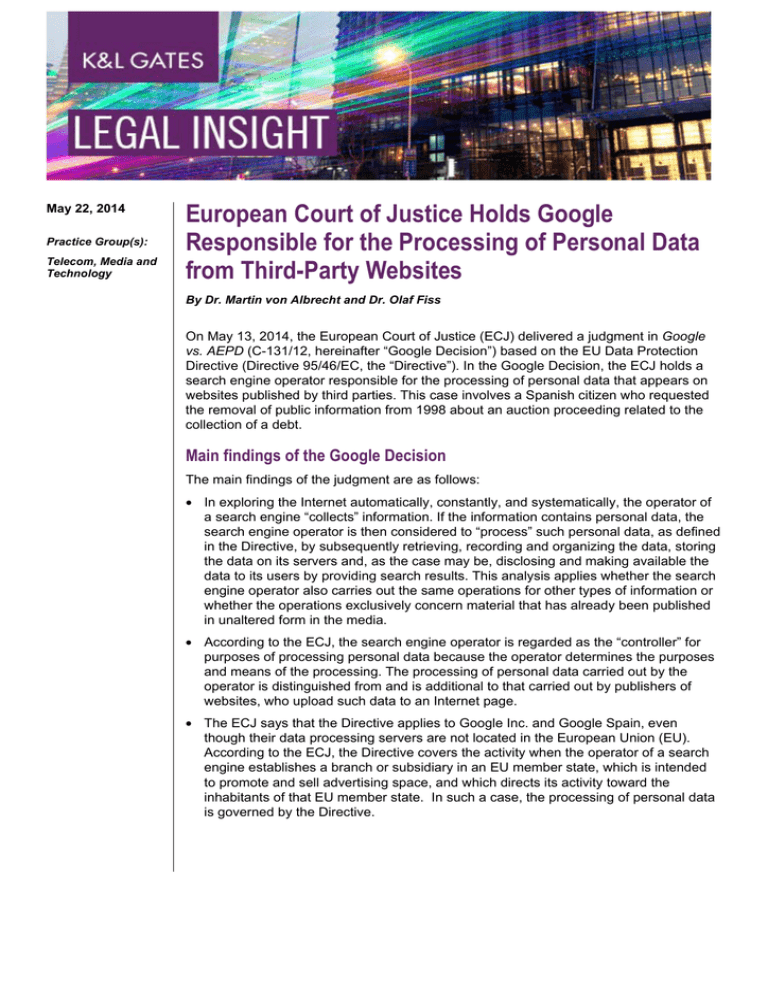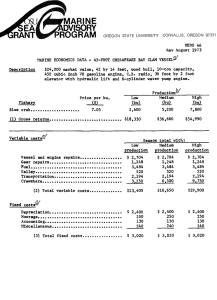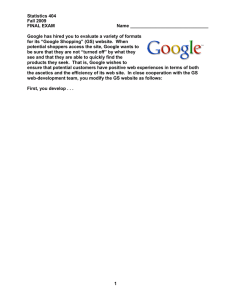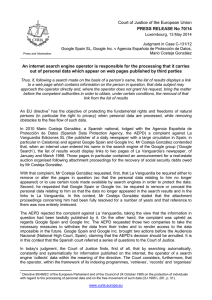European Court of Justice Holds Google from Third-Party Websites
advertisement

May 22, 2014 Practice Group(s): Telecom, Media and Technology European Court of Justice Holds Google Responsible for the Processing of Personal Data from Third-Party Websites By Dr. Martin von Albrecht and Dr. Olaf Fiss On May 13, 2014, the European Court of Justice (ECJ) delivered a judgment in Google vs. AEPD (C-131/12, hereinafter “Google Decision”) based on the EU Data Protection Directive (Directive 95/46/EC, the “Directive”). In the Google Decision, the ECJ holds a search engine operator responsible for the processing of personal data that appears on websites published by third parties. This case involves a Spanish citizen who requested the removal of public information from 1998 about an auction proceeding related to the collection of a debt. Main findings of the Google Decision The main findings of the judgment are as follows: • In exploring the Internet automatically, constantly, and systematically, the operator of a search engine “collects” information. If the information contains personal data, the search engine operator is then considered to “process” such personal data, as defined in the Directive, by subsequently retrieving, recording and organizing the data, storing the data on its servers and, as the case may be, disclosing and making available the data to its users by providing search results. This analysis applies whether the search engine operator also carries out the same operations for other types of information or whether the operations exclusively concern material that has already been published in unaltered form in the media. • According to the ECJ, the search engine operator is regarded as the “controller” for purposes of processing personal data because the operator determines the purposes and means of the processing. The processing of personal data carried out by the operator is distinguished from and is additional to that carried out by publishers of websites, who upload such data to an Internet page. • The ECJ says that the Directive applies to Google Inc. and Google Spain, even though their data processing servers are not located in the European Union (EU). According to the ECJ, the Directive covers the activity when the operator of a search engine establishes a branch or subsidiary in an EU member state, which is intended to promote and sell advertising space, and which directs its activity toward the inhabitants of that EU member state. In such a case, the processing of personal data is governed by the Directive. European Court of Justice Holds Google Responsible for the Processing of Personal Data from Third-Party Websites • According to the Google Decision, the operator of a search engine is, under certain circumstances, obliged to remove links to third-party websites that appear as results from a search using a person’s name. This even applies in cases where the links are to publications that present lawful and accurate information. • Whether the search engine operator is obliged to remove links from the list of results is subject to a balance between the legitimate interests of Internet users seeking access to valuable information and the data subject’s fundamental privacy and personal data rights. The ECJ holds that the data subject’s right to privacy and to protection of personal data not only overrides the economic interest of the search engine operator but also, as a general rule, the interests of information-seeking Internet users. • The court notes, though, that in specific cases, the balance may depend on the nature of the information in question, sensitivity for the data subject’s private life, and the interest of the public in having that information. The public interest may vary, in particular, according to the role played by the data subject in public life. • A person seeking removal of data may submit a request directly to the operator of the search engine. If the request is not granted, the person may bring the matter before a supervisory or judicial authority. Conclusion Few ECJ cases have created more controversy. This is especially true because the principle of a “right to be forgotten,” which is supported by the ECJ here, may apply to companies around the world, as long as such companies engage in business activities in Europe. Reactions to the opinion have been extraordinarily polarized. In the United States, where the First Amendment makes the restriction of search results unlikely, the Google Decision has met mainly with criticism and great reservation by commentators. In the EU, reviews appear to be more favorable. In the media, the comments range from drawing a parallel with “China’s domestic censorship of search results” (The Guardian, United States) to the “taming of the Internet giants” by a law that finally ceases to surrender to global digital powers (Süddeutsche Zeitung, Germany). Whatever the public reaction, search engine operators, and those who might be considered similarly situated, now will have to decide how they will assess and respond to removal requests and how their cost structures may have to accommodate a new function. News reports suggest that, post-Google Decision, search engine operators already have received such requests from individuals in Europe. With the Google Decision, the ECJ emphasizes the importance of the fundamental right of privacy (including the right to be forgotten) with respect to the processing of personal data. Based on the same fundamental right, the ECJ ruled on April 8, 2014, that the Directive 2006/24/EC on data retention is void. The consequence of the latest decision is that search engines may have to remove information from their results on request if such information is violating the privacy rights of third parties, even if such information is accurate. 2 European Court of Justice Holds Google Responsible for the Processing of Personal Data from Third-Party Websites As usual, the decision of the ECJ is formulated in a very general manner. Therefore, although the specific case concerns a search engine, a court of law could apply the same principles to social media platforms, like Facebook or Twitter. Such platforms typically contain personal information as well as search functions, so that the principles of the Google Decision could apply. In contrast, it seems unlikely that a court would apply the decision to search engines that do not process personal data. This decision has substantial consequences for many technology companies, whose practices may now be subject to removal requests. There likely will be some attempt in the EU by technology companies to reduce legislatively some privacy restrictions, but the after effects of this decision will play out globally for a long time to come. Authors: Dr. Martin von Albrecht martin.albrecht@klgates.com +49.30.220.029.400 Dr. Olaf Fiss olaf.fiss@klgates.com +49.30.220.029.406 Anchorage Austin Beijing Berlin Boston Brisbane Brussels Charleston Charlotte Chicago Dallas Doha Dubai Fort Worth Frankfurt Harrisburg Hong Kong Houston London Los Angeles Melbourne Miami Milan Moscow Newark New York Orange County Palo Alto Paris Perth Pittsburgh Portland Raleigh Research Triangle Park San Diego San Francisco São Paulo Seattle Seoul Shanghai Singapore Spokane Sydney Taipei Tokyo Warsaw Washington, D.C. Wilmington K&L Gates comprises more than 2,000 lawyers globally who practice in fully integrated offices located on five continents. The firm represents leading multinational corporations, growth and middle-market companies, capital markets participants and entrepreneurs in every major industry group as well as public sector entities, educational institutions, philanthropic organizations and individuals. For more information about K&L Gates or its locations, practices and registrations, visit www.klgates.com. This publication is for informational purposes and does not contain or convey legal advice. The information herein should not be used or relied upon in regard to any particular facts or circumstances without first consulting a lawyer. © 2014 K&L Gates LLP. All Rights Reserved. 3




